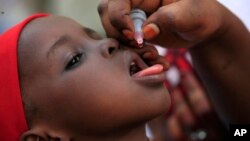Aid workers in Nigeria say they have never been closer to eradicating polio, with only four new cases reported this year. But as insurgent attacks grow more violent in the north, the workers say vaccination programs are at "high risk" and continued success will depend on new strategies to reach children in what have become war zones.
Globally, polio this year has increased by more than 15 percent, with 10 countries reporting new cases. Two years ago, there were only four countries that had polio, which can kill or cripple and there is no cure. The World Health Organization calls the spread a “public health emergency.”
But in Nigeria the number of new polio cases this year has decreased by 85 percent to four cases reported so far this year, compared to 26 cases reported in the same time frame in 2013.
“We have never gotten this close to eradicating polio. If you look at the statistics compared to last year we’ve really done very, very good,” said Kazeem Mustapha, vice chairman of Rotary International's Nigeria National PolioPlus Committee.
But northern Nigeria, where most of the polio cases are found, is getting more dangerous and Boko Haram insurgents have killed thousands of people this year alone. Militants have been holding more than 200 school girls captive for nearly three months and hundreds of other children have been slaughtered in their school houses.
Despite more than a year of emergency rule, in three northern states, Mustapha said the insurgency remains the biggest threat to meeting eradication goals. “When our field coordinators are going for a particular assignment and they get information that an area is, at that particular time, is not very safe. What do they do? They retreat,” he explained.
He said vaccination teams are still operating amid the violence and trying new strategies, like going into dangerous areas in a matter of days or hours, calling it a “hit and run.”
According to Mustapha, “firewalling” an area means setting up vaccination points around war zones, so when the people flee their homes, children can be vaccinated.
But Boko Haram attacks continue with increasing sophistication and reach. Mustapha said vaccination efforts need to do the same.
“There is need for more collaboration and gathering of intelligence, even partnership. We need security agents to advise when to move in and when to move out. Honestly speaking, it’s a problem,” he said.
But Mustapha said he is still confident that Nigeria can start the clock on declaring the country polio-free by the end of 2014. Nigeria’s last reported case was in May and it takes three years without new cases to be declared polio-free.





